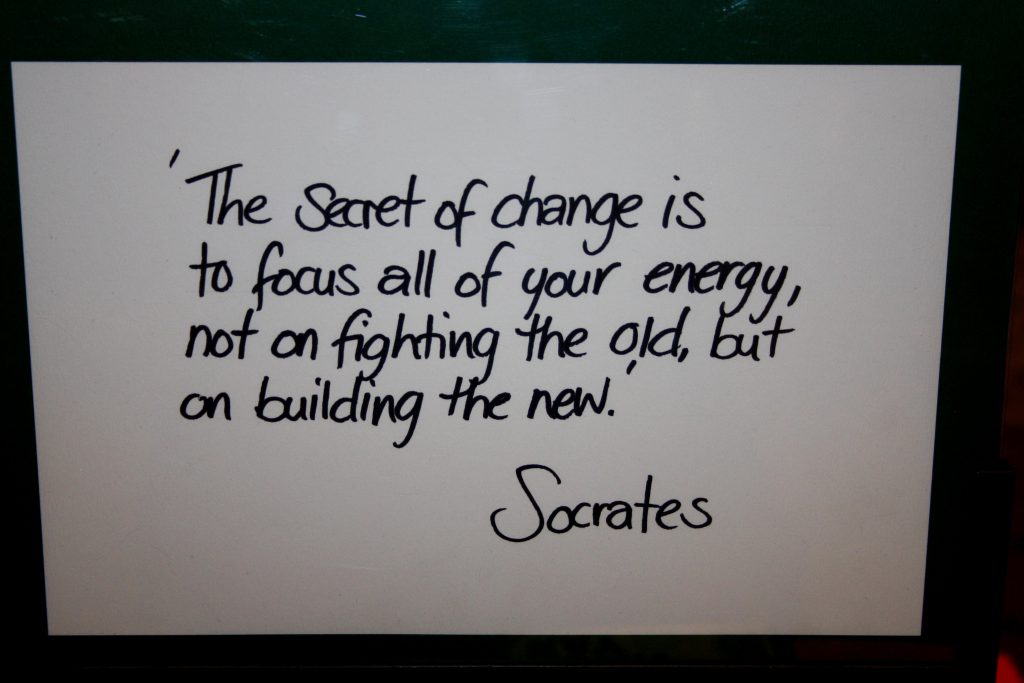This post was written by member Megan Grandmont.
“I never thought about it that way before.”
“I agree with what Julia said, but I’d like to add . . . .”
“Well, on page 57, the author states . . . .”
These are the sounds of a Socratic seminar, a “formal discussion, based on a text, in which the leader asks open-ended questions,” running as it should (Israel, cited in ReadWriteThink). At its best, the Socratic seminar discussion model challenges students to read closely, think and write critically, and articulate their thoughts clearly and respectfully.
But how can we as teachers ensure that students will achieve this level of deep engagement with a text and each other? One of the biggest risks of the Socratic seminar lies in the same quality that also makes it such a meaningful assessment—it is student centered. This means that Socratic seminars depend on the performance of the students involved. At their worst, they may devolve into shouting matches or (perhaps worse) sixty minutes of awkward silence.
Fortunately, there are concrete steps that we as teachers can take before, during, and after a Socratic seminar to cultivate effective student participation.
Before the Seminar
Prepare students with expectations for participation. Before our first Socratic seminar of the year, I distribute a handout called “Responsibilities of a Student in Socratic Seminar,” from Teaching in the Block: Strategies for Engaging Active Learners. This handout offers students ideas about how to productively and appropriately participate in a seminar in multiple ways, including “making judgments that I can defend with specific textual evidence,” “maintaining an open mind to a diversity of opinions,” and “listening attentively and patiently as peers share their ideas.” We read and discuss this list together, and I prompt students to consider what their own participation style during the seminar might look like.
Provide students with seminar questions in advance. I always require students to formally write up their responses to our seminar questions. This step goes a long way toward guaranteeing that students have done some degree of thinking about each question before our discussion. Having a written response to refer to during the seminar is useful for all students, but especially for students who are introverted or have social anxiety; it serves as a built-in talking point.
Offer a mix of required and optional seminar questions. Required questions are beneficial because everyone can speak to them during the seminar, while optional questions cater to students’ individual interests and build some flexibility into the discussion.
During the Seminar
Open with a round robin. Opening with a round robin question—where we go around the circle and each student shares their response—means that I hear every student’s voice at least once. Again, students who are introverts or who have social anxiety are never taken by surprise. This strategy works particularly well as a warm-up when the question connects to students’ personal experiences or asks them to bring in a piece of outside media. For example, during a seminar on Frankenstein and the Prometheus myth: “Describe a time when you rebelled against authority (your parents, your babysitter, your boss, your coach, your teacher, etc.). Why did you do this? What happened as a result of your rebellion? What did you learn from this experience?”
Get comfortable with the uncomfortable. So many of us are drawn to teaching English because it gives us the opportunity to talk with young people about things that matter. At times, especially in the current political climate, these conversations can be fraught and uncomfortable, and the Socratic seminar is not exempt from these tensions. But as educators, we should lean into that tension, in spite of the discomfort it may cause us. During a recent Socratic seminar on the American Dream in one of my junior classes, the conversation turned to white privilege. Regardless of strong and divergent opinions on the subject, by reminding ourselves of the expectations we had set up ahead of time (maintain an open mind; listen attentively), we successfully navigated this discussion and had a rich conversation that students won’t soon forget.
Facilitate, don’t dominate. I describe my primary function during a Socratic seminar as that of a mirror—I try to reflect back or clarify what I hear students saying. At times, as is outlined in the ReadWriteThink Strategy Guide, I may move the conversation in a new direction as needed. But I rarely participate directly, except to answer the round robin question for the purpose of community building.
After the Seminar
Allow time for reflection. This step encourages students to practice metacognition, evaluating their own performance during the seminar. At the end of each seminar, I allot ten minutes for students to respond to five questions, originally developed by my colleagues Deb Szabo and Wendy Crofts:
- What did you find most interesting about today’s seminar?
- What did you find most surprising?
- Did anything make you change your mind or think more deeply? What, how, and why/why not?
- What did you contribute to today’s seminar? Be specific.
- What might you do differently at our next seminar? Be specific.
Today’s students are growing up in a world where having a meaningful, respectful discussion has never been more challenging, or more important. By following the strategies outlined above, we prepare them for dialogical success not only in our classrooms, but also in the world beyond them.
Work Cited
Israel, Elfie. “Examining Multiple Perspectives in Literature.” In Inquiry and the Literary Text: Constructing Discussions n the English Classroom. James Holden and John S. Schmit, eds. Urbana, IL: NCTE, 2002.
 Megan Grandmont teaches 10th-grade World Literature and Composition and 11th-grade American Literature and Composition at Newburyport High School in Newburyport, MA. Follow her on Twitter: @megangrandmont.
Megan Grandmont teaches 10th-grade World Literature and Composition and 11th-grade American Literature and Composition at Newburyport High School in Newburyport, MA. Follow her on Twitter: @megangrandmont.

